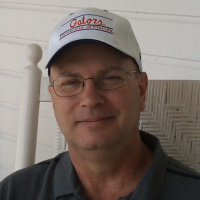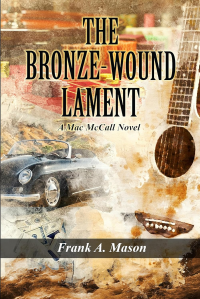Frank A Mason Interview Published on: 28, Mar 2024
 What inspired you to transition from your career in the US Air Force to becoming a college professor and then eventually pursuing a career as an author?
What inspired you to transition from your career in the US Air Force to becoming a college professor and then eventually pursuing a career as an author?
In 1997, after 22 years in the USAF, I decided I was repeating myself and retirement sounded like a new opportunity. It was time for a re-invention. I started teaching college part-time the day after my retirement ceremony. As time went on, I pursued a PhD and became more of a full-time professor. After 25 years of mentoring doctoral students as well as teaching classes and doing research, it was again time for another re-invention. I had wanted to write novels as long ago as 1980, but time and tide got away from me. Now was my chance to try writing as a novelist and not as a researcher.
I knew I could do research and had access to very powerful online research libraries, so I settled on historical fiction. It seemed a fit.
I discovered I had some talent for spinning a tale. I had learned as a teacher that one way to engage students was to tell a story, so why not fiction as an author? Words seemed to flow and situations for my characters seemed to develop naturally.
Your Journeyman Chronicles series has been well-received, with Heart of Tempered Steel winning the prestigious Florida Writer’s Association Royal Palm Literary Award. What drew you to write about the American Revolutionary War?Some small irony here. I was casting about for some historical environment to serve as a backdrop for my first novel. Meanwhile, I was engaged in casual genealogical research, trying to understand the gaps in the things my late parents told me about the families. I learned that both sides of my family had been in Edgecombe County, North Carolina, during the 1700s, and that sparked looking into the diaspora of people from Virginia (both sides of my family) to North Carolina and then southward. I wondered if any had been in the Revolutionary War. Answer: most of my ancestors were Revolutionary soldiers. It was not a long jump from family history to a character, Will Yelverton, who would carry the story of the history of the Revolution in the South.
What are the key elements you focus on when crafting suspense in your novels, both historical and modern?Since most of my historical novels (I’ve written a couple of mysteries, too) are set in war, having a character suddenly get shot at really builds some instant suspense. While I don’t want my characters to be constantly in peril, putting them in a perilous spot about every three or four chapters seems ‘right’ in holding the readers’ attention.
In my book, Sunward I’ve Climbed, I have the main character getting shot up in his Russian-built fighter plane over Spain at the end of the Spanish Civil War. His engine is dead, and he must glide to France or risk being captured and shot in Spain. Will he make it? One of my beta readers said he was forced to finish that chapter.
For my mystery novels, it is somewhat similar. The main character is always the investigator, and he (in this case, my character is male) uncovers something new every day. Each new thing builds alarm, fear, or suspicion…and that creates tension.
How do you approach the research process for your historical novels to ensure accuracy while still engaging your readers?Well, I was trained in research and have online access to very high-quality college libraries. As a PhD-level researcher, I put together a research agenda and then try to hang information on that framework.
For example, I am researching Florida history for a new series called La Florida. Unlike many other authors, I’m not going back to Ponce de Leon. Instead, I’m picking up the story in the Second Spanish Period, from just after the end of the American Revolution to (perhaps) as far as WWII. I want to focus on the conflict between the fledgling United States and Spain over control of Florida. Then, the conflict between the United States and the Seminole Indians. Hint: the U.S. won both times.
The Second Seminole War has not been deeply explored among historical novelists. I’m developing the story as a timeline of events and real people and will insert the fictional characters into the action. Journal articles, books, lectures, and other sources will provide that backdrop.
Sunlit Silence, your latest series, delves into World War II in the air. What motivated you to explore this particular period and theme?I have always been interested in aviation, particularly WW II aviation. So much so that I joined the USAF and flew B-52s for about half my 22-year career. So, there was the general interest. I have an extensive research collection on WW II history – both air war and the general ground war. Knowing how to fly an airplane and about air combat made it much easier to create a character, Trip Gibson, addicted to the adrenaline rush of flying a powerful airplane and getting shot at by an implacable foe.
Can you share any challenges you faced while writing historical fiction, particularly in capturing the essence of past eras and making them relatable to modern audiences?Early on, I determined that modern people are not much different than our predecessors. That is, we all have the same motivations: family, success, safety, and self-determination. Indeed, modern times are faster, and communications are nearly instantaneous. But the people of the 18th century were as modern as they could be given the science of their time. Considering that backdrop and adjusting for the different pace of life makes for writing a compelling story for moderns. For example, my Journeyman Chronicles character, Will Yelverton, is interested in creating a life on the frontier and is swept into the Revolution, almost against his will. Note his name “Will” – does he have free will or does he struggle for it? Also, note he is on a life journey – and no journey is without unexpected detours. (That’s as deep as I get…).
Your wife is also an accomplished author. How do your respective writing styles and genres complement each other, if at all?My wife is also a college professor. She has developed a series of children’s books focused on helping children from Pre-K to about 3rd Grade learn critical thinking skills. She’s also working on a series on coping with stress. Her focus is considerably different from mine. Where I’m focused on telling a story about history, she is engaged in more of an academic pursuit camouflaged as a playful children’s story.
While I can ‘nerd up’ with the best of them and talk about scaffolding learning as appropriate for the age group, I’ve tried to suppress that urge. Still, I do struggle with making sure my historical story doesn’t become a boring dirge.
As a member of the Florida Writer’s Association, how has being part of a writing community influenced your journey as an author?The first thing I learned as a member of FWA is that I didn’t know anything about the arena of writing and publishing. I knew nothing of how to shop my books to traditional publishers, how and where to enter contests (or the value of contests, for that matter), and a host of other things. The FWA has been of immense value to me because they helped me see elements of both the craft of writing and of the business of publishing.
I also developed a friendship with an intensely successful British historical fiction writer who filled me in on the general business of being self-published.
The idea of entering a contest never entered my mind until the FWA people pushed it. So, I entered three books last year and one for one of them. Just yesterday, I entered three more books for the 2024 Royal Palm Literary Contest. Entering was a good bit of work, but winning was well worth the effort.
What advice would you give to aspiring writers who are considering self-publishing their work, based on your own experiences with Amazon bestsellers?Good question! I just had this conversation with two different people. One is a historical novelist whom I encouraged to join the FWA chapter and attend the meetings. I also encouraged him to quit banging his head against the wall trying to traditionally publish his book and urged him to go indie.
I also urged him to learn about Amazon Ads and how to promote his book. As you know, it’s not enough to simply write a good book, you also must find a channel and aggressively market to the readers who are most likely to read your book. I recently presented to the local FWA group on marketing their books. My marketing genius friend who has helped me get an audience did the second half of the presentation. Much of what we talked about was understanding the market and learning who reads your genre and what they expect.
The other friend I talked to about being an indie author is more of a professional topics author and I had some different suggestions for him regarding how to get published. He needed a more focused publisher who would do graphics, and so on, for his business management-oriented book. But the marketing aspects are generally the same.
How do you balance your time between writing, promoting your books, and other commitments in your life?I recently was elected (or dragged, kicking and screaming) as the President of the local chapter of the Sons of the American Revolution (SAR). That has really burned time for the past three months. Last week, I finally came up for air and said, “Back to my books!” I will make good on that plan this coming week.
I don’t do much in the way of physical promotions. I decided that five hours of traveling to talk to 15 people who may or may not like historical fiction is counterproductive. I have a marketing wizard who does my Amazon ads – I dumped all other publication houses last year – and he works for an occasional bottle of bourbon. I give away some copies of my books (for example, one of the SAR chapters is auctioning off my books at their meetings with the proceeds going to their depleted general fund). I have been asked to do some presentations – e.g., Daughters of the American Revolution and the Military Officers of America.
I was delighted to learn about AllAuthor’s book feature program. That’s a great way to frame my books and get tweets into the general world of readers with not too much cost or effort on my part.
So, there are several ways that I balance my time. I know that I write better in the afternoon, so that’s when I try to carve out time to get words on paper.
Your academic background is evident in your writing, having been published in academic journals and books. How has your experience as a college professor influenced your approach to storytelling?I mentioned before that telling a story (and there’s research to support this) is a good way to get students to focus on the topic at hand. I started teaching adults in 1980, and so 44 years of telling stories in the classroom sort of naturally flowed onto the pages of a novel.
Could you share any insights into your writing process? Do you have any rituals or habits that help you stay productive and focused?Once I have done the research and have read extensively on the era in question I layout the timeline. I take a large piece of paper – like one of those flip chart sheets – and put it on the kitchen table. I use a pencil and a ruler to draw out the timeline for the story (it might span more than one book in a series). For historical novels, this is critical because the flow of history is known and you don’t want to get events out of sequence.
Then, on the same timeline, I layout the general events and characters, but not in detail. I create a list of characters and their various histories on one section of the big sheet of paper. Any other critical information goes in another corner. That sheet of paper becomes my bible for the book.
All that said, once I start writing, I’m more of a ‘pantser’ – ok, well, a plotting panser in the sense that I know I must follow the timeline.
What themes or messages do you hope readers take away from your novels, particularly those set in historical contexts?So far, all my historical novels’ main characters have been people who struggle to have free will.
I think it’s essential for moderns (or post-moderns if we’re being totally nerdy and noting that post-modernism is all about knowledge and computers and management of knowledge where modernism is about the industrial world) to understand that we’re not that different from our forebearers. They had the same motivations and the same loves and fears. Life and death for them was no different from life and death for us. The difference is the speed of living, the wealth of knowledge, and the availability of healthcare that allows us to contemplate a much longer existence. Other than that, we are the same. So, whatever happens to my characters, I hope the readers can insert themselves into the picture and know the themes are similar to their lives.
What can readers expect from you in the future? Are there any upcoming projects or genres you’re excited to explore?I mentioned the La Florida series. I plan to finish the first book this year. I also plan to write the second book of the Sunlit Silence Series of WW II in the Air this year. I am currently half way through Book IV of the Journeyman Chronicles. I will also get Book III of Sunlit Silence done in 2024 - maybe.
There is potential for a Wiregrass Series (coastal and middle Georgia in the 1700s through WW II).
I hope to write 15-20 books over the next ten years. We’ll see.
What is your takeaway based on your experiences with AllAuthor? What is it about this site that you like or dislike?I was introduced to AllAuthor by a friend in FWA. I was immediately impressed with the scope of the site and the various information available. Also, the featured book has helped me because I want someone else to do most of my marketing efforts. The price is right to feature a book on AllAuthor, and I think I’m getting attention from the tweets and other marketing.
Thanks for the opportunity to do this interview. It made me think about my processes and motivations.
Share Frank A Mason's interview
Frank A. Mason is the pseudonym of a retired US Air Force Lieutenant Colonel and seasoned college professor with a passion for storytelling. A member of the Florida Writer’s Association, Mason delves into historical and contemporary suspense, capturing readers with gripping narratives. Mason resides in Florida alongside his accomplished wife, a professor and author in her own right, whose series of children’s books captivates young minds.
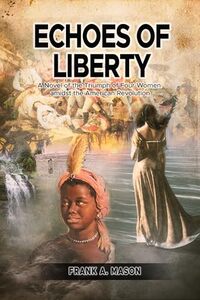 Echoes of Liberty: A Novel of Four Women's Triumph Amidst the American Revolution
Genre: Historical Fiction
Echoes of Liberty: A Novel of Four Women's Triumph Amidst the American Revolution
Genre: Historical Fiction
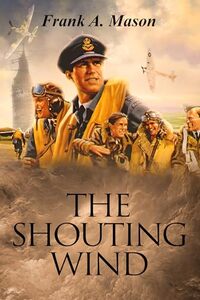 The Shouting Wind: Book Two of The Sunlit Silence Series of World War II in the Air (Sunlit Silence Series of WWII in the Air 2)
Genre: Historical Fiction
The Shouting Wind: Book Two of The Sunlit Silence Series of World War II in the Air (Sunlit Silence Series of WWII in the Air 2)
Genre: Historical Fiction
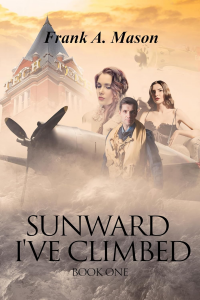 Sunward I've Climbed: Book One of The Sunlit Silence Series of World War II in the Air
Genre: Historical Fiction
Sunward I've Climbed: Book One of The Sunlit Silence Series of World War II in the Air
Genre: Historical Fiction
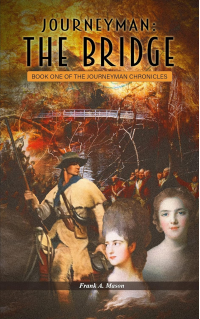 Journeyman: The Bridge: A Novel of the American Revolution (The Journeyman Chronicles Book 1)
Genre: Historical Fiction
Journeyman: The Bridge: A Novel of the American Revolution (The Journeyman Chronicles Book 1)
Genre: Historical Fiction
 Journeyman: Heart of Tempered Steel: Book Two of the Journeyman Chronicles of the American Revolution
Genre: Historical Fiction
Journeyman: Heart of Tempered Steel: Book Two of the Journeyman Chronicles of the American Revolution
Genre: Historical Fiction
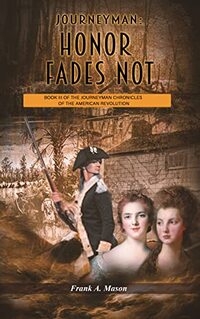 Journeyman: Honor Fades Not: Book Three of the Journeyman Chronicles of the American Revolution
Genre: Historical Fiction
Journeyman: Honor Fades Not: Book Three of the Journeyman Chronicles of the American Revolution
Genre: Historical Fiction
